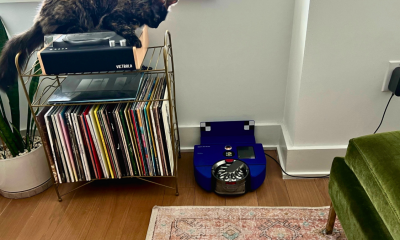Entertainment
Netflix’s ‘Tall Girl’ needs way more of Anjelika Washington’s Fareeda

When Netflix released a trailer for its new original film Tall Girl at the end of August, Twitter had a field day (as it’s wont to do). Users across the site took sides: shut down, vehemently defend, or attempt to see some semblance of value in the film. Some pointed out that the film’s protagonist, Jodi, is a white, cisgender, heterosexual, (tall) girl, and that the film ostensibly overlooks actual marginalized groups more deserving of onscreen representation. Meanwhile, allies of tall girls everywhere pointed out that being a six-foot-tall woman can be difficult, and praised the film’s premise for telling a story that many could identify with.
While I agree that Tall Girl missed its opportunity to present groundbreaking visibility for underrepresented groups, the film doesn’t break any rules or tell a harmful story marketed for teens that crosses the line between satire and insult (I’m looking at you, Insatiable). And, when you look past all the teenybopper, rom-com tropes — and there are a lot of them! — Tall Girl has its merits, namely, Anjelika Washington’s character, Fareeda, Jodi’s sage and loyal best friend.
The film follows Jodi’s journey toward self-confidence — “all 73 inches” of herself, as Fareeda says. Jodi’s inner circle also includes her friend Dunkelman (Griffin Gluck); her sister, Harper (Sabrina Carpenter); and her parents, played by Angela Kinsey — yes, that Angela — and Steve Zahn.
Ava Michelle’s performance is solid. There’s a quiet authenticity to her portrayal of a girl who’s lived her whole life being ridiculed for how tall she is. In her case, art imitates life: When Michelle was a tween, she appeared on Lifetime’s Dance Moms and was bullied by Abby Lee Miller for her height. On the reality TV series, the dancer-turned-actor shared that she was incredibly hurt by Miller’s comments, and that she’d experienced an outpouring of cyberbullying as a result of her stature. Though Michelle has just gotten her start as a film and TV actor, the depth with which she portrays Jodi’s insecurities ring true.
Throughout the film, Jodi’s self-acceptance is basically manifested via her romantic prospects. When Gluck’s Dunkelman, a self-proclaimed short king who professes his love for her on a daily basis, is Jodi’s only option, she feels her height is magnified by how much taller she is than him. So, she loathes herself and doesn’t even view her lovable friend as an option.
Enter Stig (Luke Eisner), a Swedish exchange student who’s even taller than Jodi (the joke here is that Michelle’s Jodi is actually 6′ 1′, meaning Eisner’s Stig is much more of your average tall guy than a jolly Swedish giant). Once Jodi realizes she might actually have a shot with a tall guy, she starts wearing makeup, releases her long hair from its signature tight ponytail, and generally presents as “look-at-me-because-I-look-good Jodi,” to quote Fareeda again. I would’ve rather seen her accept herself just for the hell of it, rather than do so because the “appropriate” guy finally came along. But what happens is in line for a story about a protagonist whose insecurities are fueled by constant comments made by those around her.
Amid the many ups and downs that make up the film’s oversaturated plot (Jodi’s brief courtship with her longtime bully, her sister’s upcoming beauty pageant and chronic allergies, Jodi and Stig’s Guys and Dolls duet), Fareeda makes a concerted effort to encourage Jodi to embrace her differences. At one point, Fareeda explicitly calls Jodi out for constantly seeking external validation instead of looking inward for it. In response, Jodi tells off her best friend, and that’s when Fareeda essentially disappears from the film.
Washington’s absence is palpable, and you can’t blame her character for setting boundaries with Michelle’s. Presumably, Fareeda has expended a lot of energy over the years to make Jodi feel better about herself, while Jodi neglects to do any of the work. As shown in Tall Girl, not only does Fareeda stand up to Jodi’s tormentors, she’s emotionally supportive, tells Jodi to “roll with it,” and invites her to dance away her worries.
The imbalance in their friendship is acknowledged in the film: At one point, Fareeda ponders what it would be like “to go to lunch with [her] friends and have them ask [her] about [her] problems” aloud. Once she’s gone from Jodi’s life, the movie lacks the oomph it had when Fareeda frequented its scenes as a self-assured, badass, confident teenager wise beyond her years. When Fareeda re-appears during the final 10 minutes of the film, fabulously dancing alone at the homecoming dance in an enviable fringed and sparkly frock, I breathed a sigh of relief. Not only is she a voice of reason, Fareeda is one of the only characters you can root for. Washington’s performance was a welcome reprieve from the rest of Tall Girl’s teenage chaos.
At the film’s close, Fareeda takes Jodi back after Jodi publicly repents for her misgivings and proclaims her newfound self-confidence. While narratives about learning to love yourself for who you are are important, I was far more affected and inspired by Fareeda’s evolved, self-reliant perspective, poise, and stoic ability to unwaveringly feel herself at all times. Ultimately, I would’ve rather seen an hour and 42 minutes of her story.

-

 Business4 days ago
Business4 days agoAPI startup Noname Security nears $500M deal to sell itself to Akamai
-

 Business6 days ago
Business6 days agoYoshi Mobility has come a long way since gassing up cars on the side of the road
-

 Entertainment4 days ago
Entertainment4 days agoHow to watch ‘Argylle’: When and where is it streaming?
-

 Business4 days ago
Business4 days agoUS think tank Heritage Foundation hit by cyberattack
-

 Entertainment3 days ago
Entertainment3 days agoNASA discovered bacteria that wouldn’t die. Now it’s boosting sunscreen.
-

 Entertainment3 days ago
Entertainment3 days agoDyson 360 Vis Nav robot vacuum review: Dyson should just stick to upright vacuums
-

 Business3 days ago
Business3 days agoTesla drops prices, Meta confirms Llama 3 release, and Apple allows emulators in the App Store
-

 Entertainment4 days ago
Entertainment4 days agoCrypto and taxes: Which forms you need to file



















